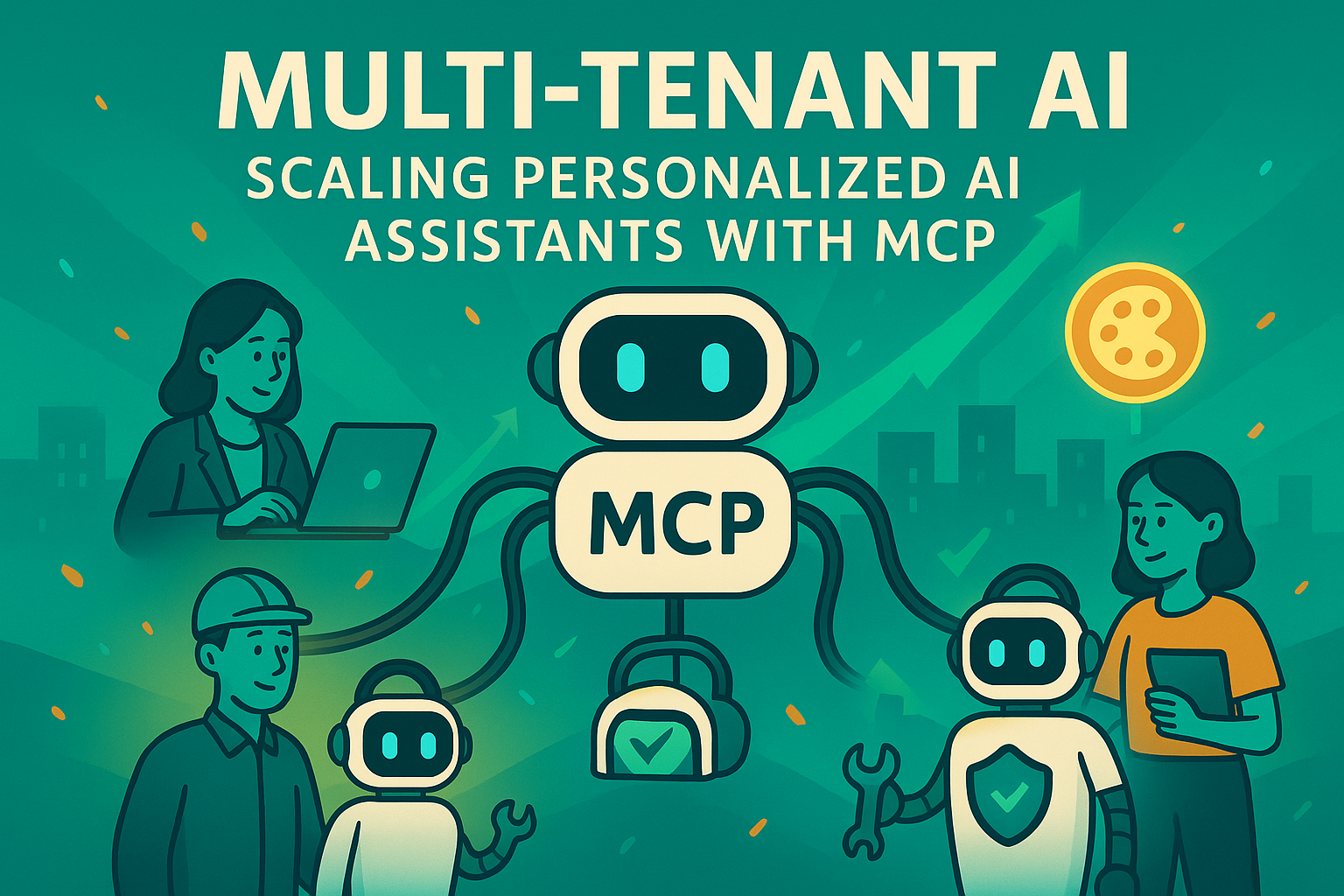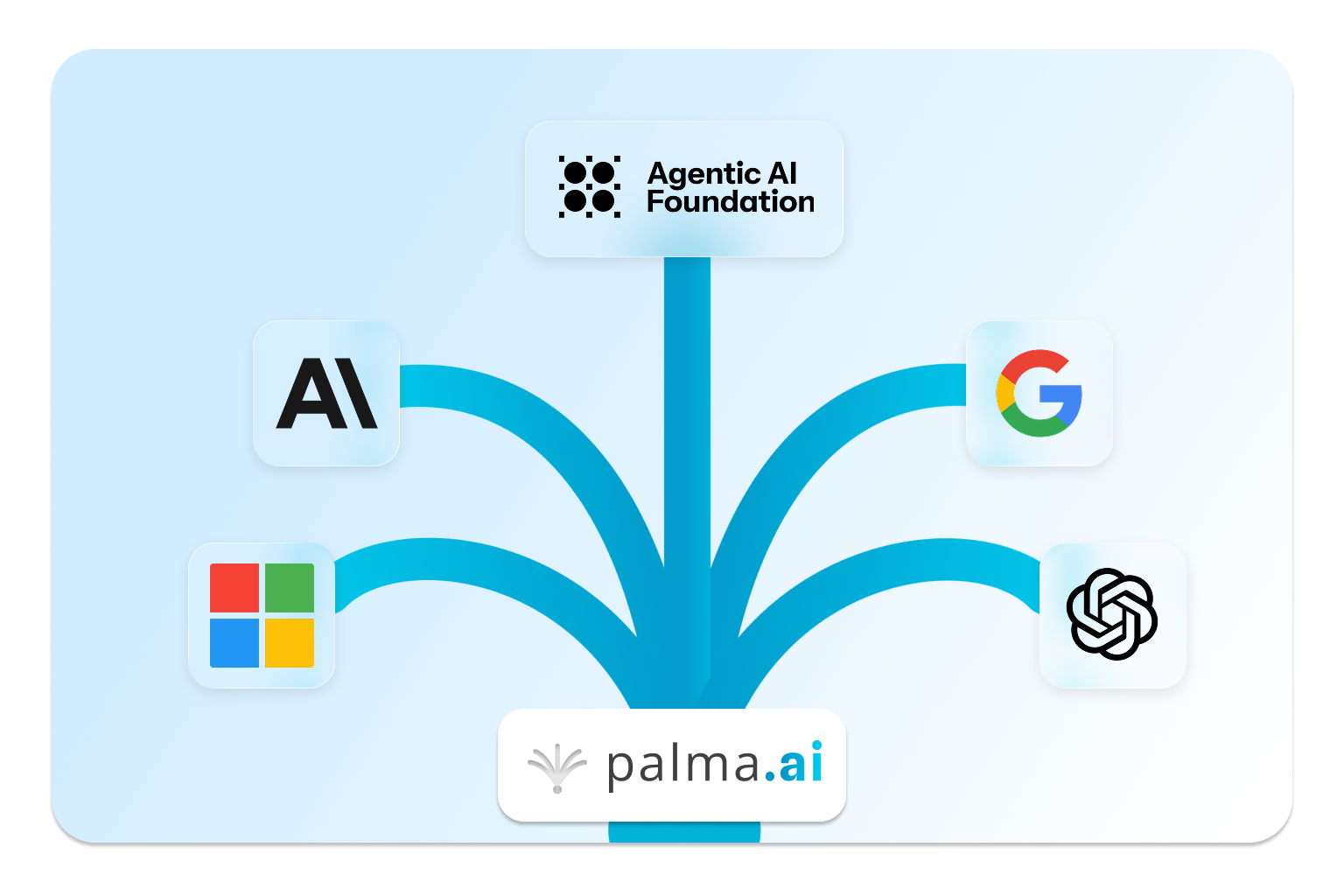Multi-Tenant AI: Scaling Personalized AI Assistants Across Enterprise Teams
Discover how multi-tenant AI architecture enables organizations to deliver specialized AI capabilities to different departments while maintaining security, governance, and cost efficiency at enterprise scale.

In today's enterprise landscape, the one-size-fits-all approach to AI deployment is rapidly becoming obsolete. Different departments within organizations have vastly different needs, workflows, and data requirements. Sales teams need AI that understands CRM data and deal pipelines. Support teams require access to ticketing systems and knowledge bases. Finance teams need AI that can interpret financial data and compliance requirements. The challenge? Delivering specialized AI capabilities at scale while maintaining security, governance, and cost efficiency.
This is where multi-tenant AI architecture becomes not just beneficial, but essential for enterprise success.
The Reality of Departmental AI Needs
Sales Teams: Relationship-Driven Intelligence
Sales professionals need AI assistants that understand the nuances of customer relationships, deal progression, and market dynamics. Their AI must integrate with CRM systems like Salesforce or HubSpot, access competitive intelligence, and understand sales methodologies specific to their industry.
Real-World Sales Workflow Example
A sales representative preparing for a client meeting needs an AI that can instantly pull the prospect's interaction history, identify similar successful deals, analyze the competitive landscape, and suggest personalized talking points based on the client's industry challenges.
Access to CRM data and customer interaction history
Market research tools and competitive intelligence
Historical deal data and success pattern analysis
Support Teams: Context-Rich Problem Solving
Customer support teams require AI assistants with deep knowledge of products, services, and customer history. Their AI needs to access ticketing systems, knowledge bases, product documentation, and customer communication history to provide accurate, helpful responses.
🎯 Support Team Workflow Example
When a customer contacts support with a complex technical issue, the AI assistant needs to access the customer's product configuration, previous support interactions, known issues database, and escalation procedures. It should be able to suggest solutions, create tickets in the appropriate system, and even schedule specialist consultations – all while maintaining strict data privacy controls.
Finance Teams: Compliance-Focused Analytics
Finance departments need AI that understands financial data, regulatory requirements, and audit trails. Their AI assistants must integrate with ERP systems, accounting software, and compliance databases while adhering to strict financial data governance policies.
Operations Teams: Process-Oriented Automation
Operations teams require AI that understands workflows, inventory systems, supply chain data, and operational metrics. Their AI needs to integrate with manufacturing execution systems, logistics platforms, and quality management tools.
Finance Workflow
Month-end closing with AI analyzing expense reports, identifying anomalies, and generating compliance reports
Operations Workflow
Supply chain disruption management with AI assessing inventory, identifying suppliers, and suggesting mitigation strategies
The Multi-Tenant Architecture Imperative
Traditional single-tenant AI deployments fail to address the diverse needs of enterprise departments. They either provide too broad access (creating security risks) or too narrow functionality (limiting effectiveness). Multi-tenant architecture solves this by creating isolated, specialized AI environments for different user groups while sharing underlying infrastructure and administrative oversight.
✅ Key Benefits of Multi-Tenant AI
Specialized Functionality
Each tenant can have AI assistants configured with department-specific tools, data sources, and capabilities.
Data Isolation
Sensitive information remains within appropriate departmental boundaries while still enabling cross-functional insights where appropriate.
Cost Efficiency
Shared infrastructure and centralized management reduce per-department deployment costs.
Unified Governance
Central IT oversight ensures consistent security policies, compliance monitoring, and performance management across all tenants.
Scalable Administration
New departments or teams can be onboarded quickly with pre-configured templates and role-based access controls.
How palma.ai Delivers Enterprise Multi-Tenant AI Excellence
palma.ai's multi-tenant architecture is purpose-built for enterprise complexity, recognizing that effective enterprise AI requires more than powerful models – it demands the right capabilities delivered to the right users with precise access control and governance.
Centralized MCP Management with Departmental Customization
palma.ai provides a unified control plane where IT administrators can manage Model Context Protocol integrations across all departments while enabling each tenant to customize their AI assistants with department-specific MCP servers and capabilities.
Enterprise-Grade Security and Compliance
Our platform ensures that each tenant operates within strict security boundaries while maintaining comprehensive audit trails and compliance monitoring across all AI interactions. This is crucial for organizations operating in regulated industries or handling sensitive data.
Scalable Infrastructure
Built on cloud-native architecture, palma.ai automatically scales to support thousands of users across multiple tenants without performance degradation, ensuring consistent response times whether supporting a 10-person finance team or a 500-person sales organization.
Role-Specific AI Assistant Deployments
palma.ai enables organizations to deploy multiple AI assistant variants optimized for specific roles:
Sales Development Representatives (SDRs)
AI assistants focused on lead qualification, prospecting, and initial engagement activities, with access to lead scoring tools and outreach templates.
Account Executives
AI support for deal progression, proposal generation, and strategic account planning, integrated with opportunity management and competitive intelligence systems.
Support Tier 1 Agents
AI assistants trained on common issues and standard resolution procedures, with direct integration to ticketing systems and knowledge bases.
Support Engineers
AI with deep technical knowledge and escalation capabilities, connected to diagnostic tools and engineering documentation.
Financial Analysts
AI assistants capable of complex financial modeling and regulatory reporting, with secure access to ERP and financial planning systems.
Cross-Tenant Insights and Collaboration
While maintaining strict data isolation, palma.ai's architecture enables controlled cross-tenant insights where appropriate and authorized. For example, sales teams can access relevant support case summaries to better understand customer pain points, while support teams can see sales context to provide more informed assistance. These cross-tenant interactions are governed by strict policies, approval workflows, and comprehensive audit trails.
Centralized Management with Distributed Control
palma.ai's hybrid management approach allows IT administrators to maintain centralized oversight of all tenants while enabling departmental administrators to manage their specific environments. This ensures consistent security and compliance policies while providing the flexibility that different departments need to optimize their AI implementations.
🎯 Key Management Features
Policy Engine
Centralized policy management with tenant-specific customization capabilities
Usage Analytics
Comprehensive dashboards showing AI usage patterns, popular integrations, and ROI metrics across all tenants
Resource Management
Automated resource allocation and cost optimization across tenants
Integration Marketplace
Curated library of pre-built MCP integrations that can be deployed across appropriate tenants
Implementation Strategy for Enterprise Multi-Tenant AI
Assessment and Planning
Conduct comprehensive assessment of departmental AI needs, data sources, and integration requirements. Understand how departments interconnect and where shared insights provide value.
Pilot Deployment
Start with one or two departments to validate the multi-tenant approach, refine policies, and demonstrate value before full-scale deployment.
Scaled Rollout
With proven processes in place, rapidly deploy AI assistants across remaining departments, leveraging templates and best practices from the pilot phase.
Optimization and Evolution
Continuously optimize tenant configurations, expand integration capabilities, and refine cross-tenant collaboration policies based on usage patterns and business needs.
The Competitive Advantage of Multi-Tenant AI
Organizations that successfully implement multi-tenant AI architectures gain significant competitive advantages. They can respond more quickly to market changes, make more informed decisions based on cross-departmental insights, and provide superior customer experiences through AI-powered efficiency gains.
The key is choosing a platform like palma.ai that understands the complexity of enterprise requirements and provides the architectural foundation for scalable, secure, and effective multi-tenant AI deployment.
As AI becomes increasingly central to business operations, the organizations that thrive will be those that can deliver specialized, powerful AI capabilities to every team while maintaining the governance, security, and efficiency that enterprise success demands.
Multi-tenant AI isn't just a technical architecture choice – it's a strategic imperative for the AI-powered enterprise of the future.
Read More

Palma.ai Joins OpenAI, Anthropic & Microsoft as AAIF Member
Palma.ai is proud to join the Agentic Artificial Intelligence Foundation (AAIF) as a Silver-tier member alongside founding members Anthropic, OpenAI, Google, AWS, and Microsoft to shape the future of AI agent standards.

The New Protocol Era: How MCP and Agent2Agent Are Following the Kubernetes Playbook
Google's donation of Agent2Agent to the Linux Foundation signals standardized AI agent communication. Discover how MCP and A2A protocols are creating the Kubernetes moment for enterprise AI.
Ready to Future-proof your AI Strategy?
Transform your business with secure, controlled AI integration
Connect your enterprise systems to AI assistants while maintaining complete control over data access and user permissions.